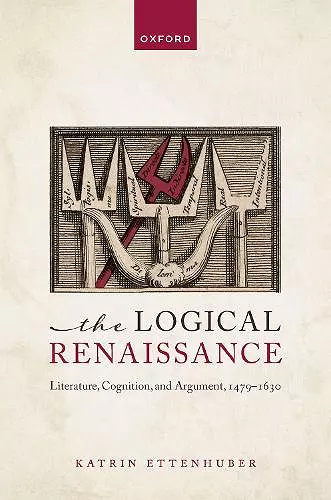The Logical Renaissance
Literature, Cognition, and Argument, 1479-1630
Format:Hardback
Publisher:Oxford University Press
Published:12th Oct '23
Should be back in stock very soon

The Logical Renaissance: Literature, Cognition, and Argument, 1479-1630 is the first substantial account of early modern English literature's deep but uncharted relationship with logic. The nature and functions of logic have been largely misunderstood in literary criticism of the period, where it is often seen as sterile and formalistic: either an overcomplex remnant of Medieval philosophy superseded by rhetoric, or part of a Ramist pedagogy so stripped back that it had little to offer in the way of creative inspiration. Katrin Ettenhuber shows instead that early modern writers encountered in their study of logic a vibrantly practical art of argument and reasoning, which provided rich opportunities for imaginative engagement and artistic appropriation. The book opens with a clear and accessible introduction to the logical terms and concepts that will guide the discussion. It charts changes in logic education between the late fifteenth and early seventeenth centuries, before presenting a series of case studies that illustrate the creative applications of logic across a wide range of genres, including epic and lyric poetry, drama, and religious prose. The Logical Renaissance demonstrates, for the first time, logic's central role in the literary culture of early modern England.
This strikingly original account of the role of logic in early modern England reconfigures our understanding not just of the intellectual and educational contexts that shaped literary production but of how thinking is put to work in the very fabric and form of treatises, poems, sermons and plays from Thomas Wilson and Edmund Spenser to Lancelot Andrewes, Donne, Shakespeare and early Milton. Paradigm-shifting and authoritative, it challenges and lucidly advances much that we thought we knew about rhetoric and the Renaissance. Every reader interested in the period will learn from this foundational study and delight in the brilliance of its ideas. * John Kerrigan, Professor of English 2000, University of Cambridge--author of Shakespeare's Originality *
In this spectacular book, Katrin Ettenhuber meticulously reconstructs the place of logic within the structures through which the early moderns were taught to think and write. The subject is fascinating in its own right. But The Logical Renaissance finds in it a vantage from which to generate fresh interpretations of even the most familiar literary texts; moreover, it shows that to read early modern texts logically is to attend to the crucial significance of literature as the work of ethics. This is a bold, sophisticated, and critically sensitive study that will be required reading for all scholars of early modern literature and culture. * Rhodri Lewis, Professor of English, Princeton University--author of Hamlet and the Vision of Darkness *
This close scholarly study is well researched and includes a reading list and a 22-page bibliography...Highly recommended. Graduate students, researchers, faculty. * Choice *
The Logical Renaissance attempts to survey canonical literature of all forms in its relentless pursuit of logic's influence. * Flynn Allott, Comitatus 55 *
- Winner of Winner, 2024 Rose Mary Crawshay Prize.
ISBN: 9780198881186
Dimensions: 240mm x 163mm x 22mm
Weight: 610g
318 pages